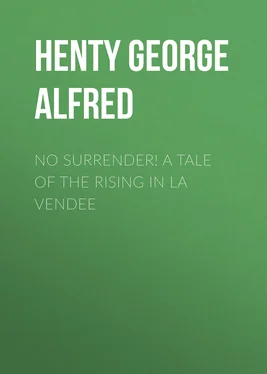George Henty - No Surrender! A Tale of the Rising in La Vendee
Здесь есть возможность читать онлайн «George Henty - No Surrender! A Tale of the Rising in La Vendee» — ознакомительный отрывок электронной книги совершенно бесплатно, а после прочтения отрывка купить полную версию. В некоторых случаях можно слушать аудио, скачать через торрент в формате fb2 и присутствует краткое содержание. Жанр: foreign_children, foreign_antique, foreign_prose, prose_military, на английском языке. Описание произведения, (предисловие) а так же отзывы посетителей доступны на портале библиотеки ЛибКат.
- Название:No Surrender! A Tale of the Rising in La Vendee
- Автор:
- Жанр:
- Год:неизвестен
- ISBN:нет данных
- Рейтинг книги:4 / 5. Голосов: 1
-
Избранное:Добавить в избранное
- Отзывы:
-
Ваша оценка:
- 80
- 1
- 2
- 3
- 4
- 5
No Surrender! A Tale of the Rising in La Vendee: краткое содержание, описание и аннотация
Предлагаем к чтению аннотацию, описание, краткое содержание или предисловие (зависит от того, что написал сам автор книги «No Surrender! A Tale of the Rising in La Vendee»). Если вы не нашли необходимую информацию о книге — напишите в комментариях, мы постараемся отыскать её.
No Surrender! A Tale of the Rising in La Vendee — читать онлайн ознакомительный отрывок
Ниже представлен текст книги, разбитый по страницам. Система сохранения места последней прочитанной страницы, позволяет с удобством читать онлайн бесплатно книгу «No Surrender! A Tale of the Rising in La Vendee», без необходимости каждый раз заново искать на чём Вы остановились. Поставьте закладку, и сможете в любой момент перейти на страницу, на которой закончили чтение.
Интервал:
Закладка:
As soon at it was done, Leigh led them to the spot where the forest began, some thirty yards up the hill, and set them to fell trees. This was work to which all were accustomed and, as many of them carried axes, the trees nearest to the road were felled to fall across it; while on each side facing the stream, they were cut so as to fall down the slope, and so form an abattis.
Before the work was finished, to a distance of two or three hundred yards on each side of the road, several hundred peasants had come up. Of these, about a third were armed with muskets. Seeing the advantage of the position; and that, in case it was forced, the forest offered them a means of retreat, all prepared for a desperate resistance. The men with firearms were placed in the front rank. Those with pitchforks, and other rural weapons, were to keep at work till the last moment, cutting underwood, and filling the interstices between the boughs of the fallen trees, so as to make it extremely difficult to force. They were ordered to withdraw, when the fight began, to a distance of two or three hundred yards; and then to lie down, in any inequalities of the ground, so as to be safe from cannon shot Only when the defenders of the abattis were forced back, were they to prepare to charge.
A young fellow with a cow horn took his place by Leigh's side. When he blew his horn, the front rank were to run back, and the reserve to come forward to meet them; and then they were to rush down again upon their assailants who had passed the abattis, and to hurl them into the stream.
The peasants all recognized the advantages of these arrangements. Those who had come first had found Leigh in command and, by the readiness with which he was obeyed by his own followers, saw at once that he was in authority. As others came up, he showed them Cathelineau's circular. These recognized its order, and informed the later arrivals that the young officer, who was giving orders, was specially empowered by Cathelineau to take command; and Leigh was as promptly obeyed as if he had been their favourite leader, himself. They saw, too, that he knew exactly what he wanted done, and gave every order with firmness and decision; and their confidence in him became profound.
It was three hours after he arrived at the river when a party of horse came down the opposite slope. Leigh had ordered that not a shot was to be fired, until he gave the signal. He waited until the enemy came to the severed bridge, when they halted suddenly; and as they did so he gave the word and, from the long line of greenery, fifty muskets flashed out. More than half the troop of horse fell; and the rest, turning tail, galloped up the hill again, while a shout of derision rose from the peasants.
Half an hour passed, then the head of the column was seen descending the road. It opened out as it came, forming into a thick line of skirmishers, some two hundred yards wide. Moving along, Leigh spread the musketeers to a similar length of front. At first, the enemy were half hidden by the wood at the other side of the slope; but as they issued from this, some twenty yards from the stream, a scattered fire broke out from the defenders.
The Blues replied with a general discharge at their invisible foes, but these were crouching behind the stumps or trunks of the felled trees, and the fire was ineffectual. Leigh's own band were lying in a little hollow, twenty yards behind the abattis; their pistols would have been useless, until the enemy won their way up to the trees, and until then they were to remain as a first reserve.
Exposed as they were to the steady fire of the peasants, the assailants suffered heavily and, at the edge of the stream, paused irresolutely. It was some fifteen yards wide, but they were ignorant of the depth, and hesitated to enter it; urged, however, by the shouts of their officers, who set the example by at once entering the stream, and by seeing that the water did not rise above their shoulders, the men followed. But as they gained the opposite bank, they fell fast. At so short a distance, every shot of the peasants told; and it was some time before a sufficient number had crossed to make an assault against the wall of foliage in their front.
Fresh troops were constantly arriving from behind and, encouraged by this, they at last rushed forward. As they did so, Leigh called up his own band; and these, crawling forward through the tangle as far as they could, opened fire on the enemy, as they strove to push their way through the obstacle.
For a quarter of an hour the fight went on. Then the assailants, having with great loss succeeded in passing over or pulling aside the brushwood, began to pour through. The moment they did so, Leigh's horn sounded; and at once the defenders rushed up the hill, pursued by the Blues, with exulting shouts. But few shots were fired, for the assailants had emptied their muskets before striving to pass through the obstacle.
Leigh and his men had run but a hundred yards into the wood when they met the main body of the peasants, rushing down at full speed. Turning at once, his party joined them, and fell upon the advancing enemy. Taken wholly by surprise, when they believed that victory was won, the two or three hundred men who had passed the abattis were swept before the crowd of peasants like chaff. The latter, pressing close upon their heels, followed them through the gaps that had been made.
The panic of the fugitives spread at once to those who had crossed the river, and were clustered round the openings, jostling in their eagerness to get through and join, as they believed, in the slaughter of those who had caused them such heavy loss; and all fled together. The peasants were at their heels, making deadly use of their pitchforks, axes, and knives, and drove the survivors headlong into the river. The horn again sounded and, in accordance with the strict orders that they had received, they ran back again to their shelter; a few dropping from the scattered fire that the troops on the other side of the stream opened against them, as soon as the fugitives had cleared away from their front.
Scarcely had the peasants gained the shelter when six pieces of cannon, that had been placed on the opposite slope while the fight was going on, opened against them.
Leigh at once ordered the main body back to their former position, scattering his hundred men with guns along the whole line of abattis, whence they again opened fire on the troops on the opposite side of the river. These replied with volleys of musketry; but the defenders, stationed as they were five or six yards apart, and sheltering behind the trees, suffered but little either from the artillery or musketry fire; while men dropped fast in the ranks of the Blues.
The cannon were principally directed against the trees blocking the road. Gradually these were torn to pieces and, after an hour's firing, were so far destroyed that a passage through them was comparatively easy. Then the enemy again began to cross the stream.
As soon as they commenced to do so, Leigh called up the men with muskets from each flank, and sent word to the main body to descend the hill again, as the cannonade would cease as soon as the attack began. Three times the assault was made and repulsed, the peasants fighting with a fury that the Blues, already disheartened with their heavy losses, could not withstand. As they fell back for the third time, Leigh thought that enough had been done, and ordered the peasants at once to make through the woods, and to proceed by-lanes and byways to join Cathelineau; who, he doubted not, would by this time have gathered a considerable force at Chemille.
By the time that the Blues were ready to advance again, this time in overwhelming force, the peasants were well away. The wounded, as fast as they fell, had been carried off to distant villages; and when the enemy advanced they found, to their surprise, that their foes had disappeared, and that only some thirty dead bodies remained on the scene of battle.
Читать дальшеИнтервал:
Закладка:
Похожие книги на «No Surrender! A Tale of the Rising in La Vendee»
Представляем Вашему вниманию похожие книги на «No Surrender! A Tale of the Rising in La Vendee» списком для выбора. Мы отобрали схожую по названию и смыслу литературу в надежде предоставить читателям больше вариантов отыскать новые, интересные, ещё непрочитанные произведения.
Обсуждение, отзывы о книге «No Surrender! A Tale of the Rising in La Vendee» и просто собственные мнения читателей. Оставьте ваши комментарии, напишите, что Вы думаете о произведении, его смысле или главных героях. Укажите что конкретно понравилось, а что нет, и почему Вы так считаете.












